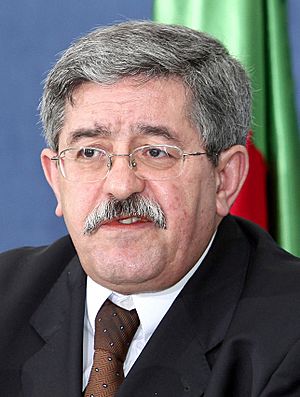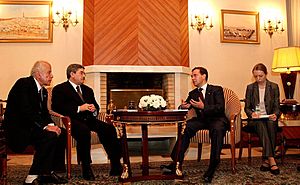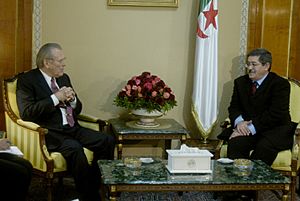Ahmed Ouyahia facts for kids
Quick facts for kids
Ahmed Ouyahia
|
|
|---|---|
|
أحمد أويحيى
|
|

Ouyahia in 2011
|
|
| Prime Minister of Algeria | |
| In office 16 August 2017 – 12 March 2019 |
|
| President | Abdelaziz Bouteflika |
| Preceded by | Abdelmadjid Tebboune |
| Succeeded by | Noureddine Bedoui |
| In office 23 June 2008 – 3 September 2012 |
|
| President | Abdelaziz Bouteflika |
| Preceded by | Abdelaziz Belkhadem |
| Succeeded by | Abdelmalek Sellal |
| In office 11 August 2004 – 24 May 2006 |
|
| President | Abdelaziz Bouteflika |
| Preceded by | Ali Benflis |
| Succeeded by | Abdelaziz Belkhadem |
| In office 31 December 1995 – 15 December 1998 |
|
| President | Liamine Zéroual |
| Preceded by | Mokdad Sifi |
| Succeeded by | Smail Hamdani |
| Secretary General of the Democratic National Rally | |
| In office 10 June 2015 – 25 June 2019 Acting: 10 June 2015 – 5 May 2016 |
|
| Preceded by | Abdelkader Bensalah |
| Succeeded by |
|
| In office 26 January 1999 – 3 January 2013 |
|
| Preceded by | Tahar Benaibèche |
| Succeeded by | Abdelkader Bensalah |
| Personal details | |
| Born | 2 July 1952 Iboudraren, Algeria |
| Political party | Democratic National Rally |
Ahmed Ouyahia (Arabic: أحمد أويحيى, romanized: Aḥmad ʾŪyaḥyā) was an important politician from Algeria. He was born on July 2, 1952. He served as the prime minister four different times: from 1995 to 1998, 2004 to 2006, 2008 to 2012, and 2017 to 2019.
Before becoming prime minister, Ouyahia was a diplomat, which means he worked for his country in other nations. He also served as the Minister of Justice. He helped start a political party called the Democratic National Rally (RND) and was its leader for a long time. He was known for being close to the Algerian military. In March 2019, he stepped down as prime minister. Later, he was arrested and found guilty of some wrongdoings. He is currently serving time in jail.
Contents
Early Life and School
Ahmed Ouyahia was born in a village called Bouadnane in the Tizi Ouzou Province of Algeria. This was on July 2, 1952. He started his primary school in Algiers, the capital city.
He then went to El Idrissi High School in Algiers. In 1972, he earned his high school diploma. After that, he joined a special school called the "National High Studies School of Administration" in Algiers. This school trained people for important government jobs. He studied diplomacy there and finished in 1976. From 1976 to 1978, he served in the military, working with the press for the Algerian President.
Starting His Career
In 1979, Ouyahia began working for the Ministry of Foreign Affairs. He worked in the department that dealt with African countries. In 1980, he became an advisor to the Algerian Ambassador in Ivory Coast. He stayed there until 1982.
Working at the United Nations
In 1982, he moved to New York. There, he was an advisor to Algeria's team at the United Nations headquarters. The United Nations is an organization where countries work together on global issues. In 1988, Ouyahia became the head of the African department at the foreign affairs ministry. From 1988 to 1989, he also helped represent Algeria at the United Nations Security Council. He was an advisor to the Minister of Foreign Affairs from 1990 to 1991.
Ambassador to Mali
He led the African department until 1991. Then, he was named the Ambassador to Mali. He worked in Mali from 1992 to 1993. While there, he helped make a peace deal in 1992. This deal was between the government of Mali and the Tuareg people, who were in a rebellion. The agreement was called the "Pacte National" treaty.
In August 1993, Ouyahia returned to Algiers. He took on important roles in foreign affairs for the government of Redha Malek.
Working for the President
In April 1994, he became the cabinet director for President Liamine Zeroual. In this role, he handled important political matters. This included preparing for the 1995 presidential election, which President Zeroual won. During the Algerian Civil War in the 1990s, Ouyahia supported a strong approach against armed groups. He was also involved in creating citizen groups for defense.
First and Second Times as Prime Minister
In December 1995, Ahmed Ouyahia became Prime Minister for the first time. He held this position until December 1998. He stepped down after Abdelaziz Bouteflika was elected president. At that time, Algeria was facing economic challenges and public sector strikes. This made him less popular, leading to his resignation.
In 2000, Ouyahia was elected as the leader of the National Rally for Democracy (RND) party. He had helped create this party earlier. He resigned from this leadership role on January 5, 2013.

Minister of Justice and Peace Efforts
From 1999 to 2002, Ouyahia served as the Minister of State for Justice. During this time, President Bouteflika asked him to help make a peace deal between Ethiopia and Eritrea. Ouyahia worked with Anthony Lake, an advisor to the US President Bill Clinton. They successfully helped secure a peace deal, which was signed in Algiers in December 2000.
In February 2001, as justice minister, Ouyahia suggested new laws. These laws would have put people in prison for writing or drawing things that were seen as "defamatory" to political leaders.
Return to Prime Minister Role
In June 2002, Ouyahia resigned after his party lost in the parliamentary election. He was then given an honorary position as Special Representative of the President. In August 2004, Ouyahia was named prime minister for a second time. This happened after a political disagreement between President Bouteflika and the previous prime minister. Ouyahia served for three years until May 24, 2006. He resigned again due to political disagreements between his party and President Bouteflika's party.
Economic Challenges During His Term

In late 2004, teachers went on strike because of low wages. Prime Minister Ouyahia did not want to meet with the unions at first. The government even suspended some teachers. Only when a larger union joined the strike did the government agree to raise wages.
His resignation in May 2006 was partly because he was not popular with the public. This was due to his opposition to public sector strikes and his support for selling off government-owned businesses.
Human Rights Concerns
In June 2005, Ouyahia criticized Al-Jazeera television. His government had closed the channel. He said it was trying to "tarnish Algeria's image." The channel had shown reports that were critical of the government.
Helping in Kabylie
Ouyahia is known for helping to solve a long-standing disagreement. This was between protesters from his home region of Kabylie and the government. In 2005, the government worked to reduce tensions. Prime Minister Ahmed Ouyahia reached an agreement with a leader from Kabylie, Belaid Abrika. This agreement addressed economic and social concerns. It also made regional elections possible in November 2005. Ouyahia visited opposition leaders and spoke on Berber-language media to encourage reconciliation.
Third and Fourth Times as Prime Minister
After being involved in international meetings in 2008, Ouyahia was again named Prime Minister on June 23, 2008. He promised to continue the President's policies. His term ended on September 3, 2012, and Abdulmalek Sellal took over.
In March 2014, President Bouteflika appointed Ouyahia as Director of the Cabinet of the Presidency. This was a high-ranking position. Ouyahia was appointed prime minister for the fourth time on August 15, 2017. He took office the next day.
In October 2018, Ouyahia announced that Algeria would ban the burqa in workplaces. In March 2019, Ouyahia resigned as prime minister. This happened after President Bouteflika said he would not seek re-election, following protests across the country. In June 2019, Ouyahia was arrested as part of an investigation into wrongdoings. In December 2019, he was found guilty and sentenced to jail. In March 2020, an appeals court confirmed his sentence. On January 4, 2021, Ouyahia received another jail sentence related to a different case.
Images for kids
See also
 In Spanish: Ahmed Ouyahia para niños
In Spanish: Ahmed Ouyahia para niños
 | Laphonza Butler |
 | Daisy Bates |
 | Elizabeth Piper Ensley |




